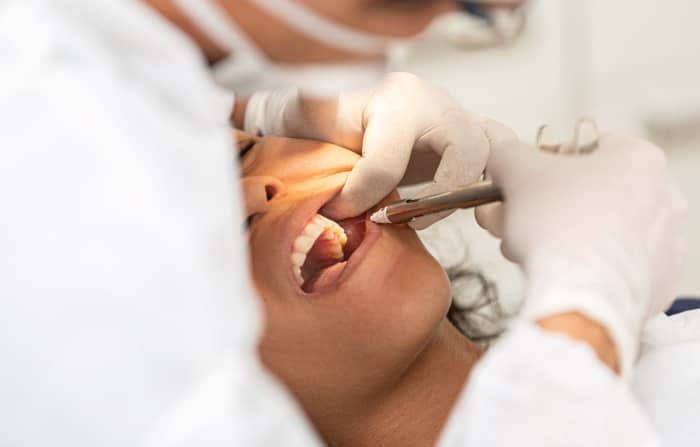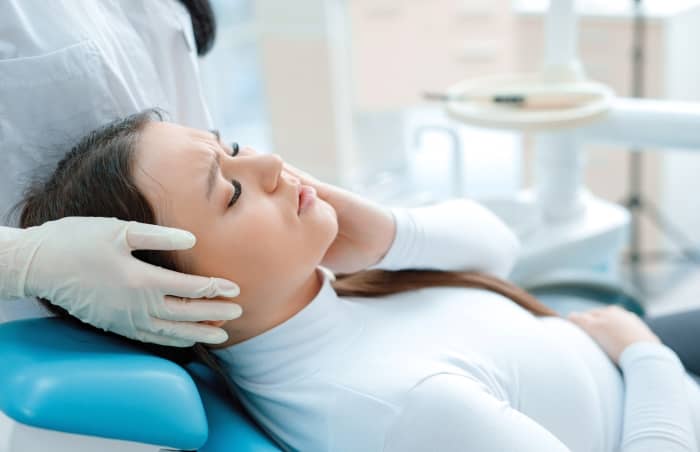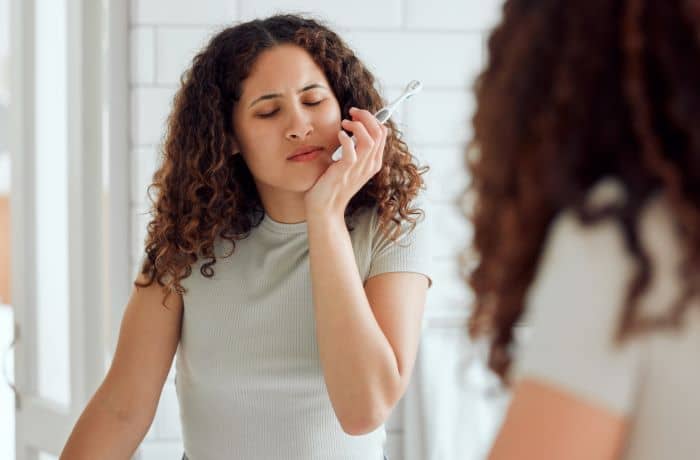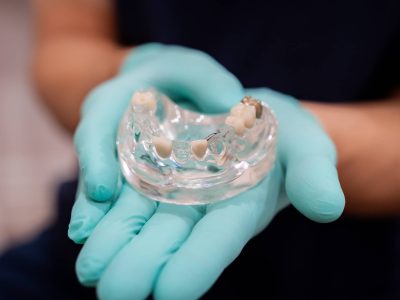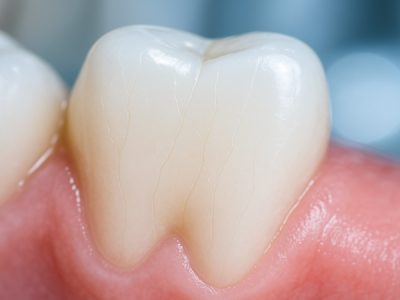“You need wisdom tooth extraction”.
If your dentist has recommended wisdom tooth extraction, you may be feeling intimidated and nervous about the procedure. But we’re here to educate you on what to expect before, during, and after wisdom tooth removal so you can approach your appointment with confidence.
We’ll cover what to expect when getting your wisdom tooth removed, including frequently asked questions about wisdom tooth extraction and details on aftercare.
How to Prepare for Wisdom Tooth Extraction
Before your wisdom tooth extraction, your dentist will advise you on exactly how to prepare and what to avoid before wisdom tooth surgery.
Here are some general guidelines to follow before wisdom tooth removal:
- Stock up on foods to eat after wisdom tooth removal
- Do not smoke for at least eight hours before the procedure
- Do not drink alcohol for at least eight hours before
- Do not eat or drink anything for eight hours before
- Brush your teeth beforehand
- Wear loose-fitting, comfortable clothes
- Have a trusted friend or family member lined up to give you a ride home after the procedure
Most importantly, remind yourself that you can rest easy knowing you are in the hands of experts at Chelmsford Dental. Our highly trained staff is skilled at ensuring your entire experience is as comfortable and calming as possible. Many of our patients end up surprised by how painless wisdom tooth extraction can be.
What to Expect During Wisdom Tooth Removal
Before the procedure, we make sure our patients are informed on exactly what to expect during and after the process. Remember, this is a common procedure that goes quickly and typically involves a fairly fast recovery. Typically, wisdom tooth removal is a straightforward and quick process.
The exact procedure will depend on your case and how many wisdom teeth you need removed, but you can generally expect the following steps:
- Your teeth and mouth will be numbed with the appropriate local anaesthesia
- An appropriate sedation method will be used to keep you relaxed and pain-free during the extraction process
- Once you are numb, the dentist will expose the tooth by making an incision in the gum
- If your case is difficult, the wisdom tooth will be divided into several pieces before the removal
- Once the tooth is removed, the extraction site will be thoroughly cleaned and any debris will be removed
- The area will be stitched up to promote a speedy recovery
- A gauze will be placed over the extraction site to promote clotting and control bleeding
Related Reading: The Complete Guide to Wisdom Tooth Extraction
What to Expect After Wisdom Tooth Removal
After your surgery, you will likely experience some discomfort and swelling, but proper aftercare can keep you comfortable and promote a fast recovery.
Here is an idea of what to expect after wisdom tooth removal and how to minimise discomfort.
Pain
We will do everything we can to keep you comfortable during and after surgery. After a few hours, the local anaesthesia will begin wearing off. At this time, you can follow the advice from your dentist concerning over-the-counter or prescribed medication. Pain should get better each day following surgery.
Swelling
After the extraction, you may experience swelling of the sides of your face, eyes, mouth, and cheeks. To minimise swelling after wisdom tooth removal, cold compresses or ice packs can be placed on the outside of the mouth, on and off, during the first 36 hours. Swelling should begin subsiding two to three days post-surgery.
Bleeding
Expect some light bleeding after wisdom tooth extraction. A gauze will be placed over the extraction site. Keep the gauze in place for at least 30 minutes after the procedure to help control bleeding and encourage clotting. You can gently bite down on the gauze pad to help promote clotting.
Nausea and Vomiting
Some patients experience nausea or vomiting after wisdom tooth surgery. If you experience nausea or vomiting, wait at least an hour after surgery before sipping water or taking your prescribed medicine.
Discolouration
Yellow, green, blue, or black discolouration may occur two to three days post-surgery as a result of blood spreading underneath the tissues. You can apply moist heat to the area to help get rid of discolouration.
Sore Throat
Some patients report pain when swallowing or a sore throat in the two to three days after wisdom tooth removal. This is a result of swelling. Your jaw muscles may also feel a little stiff in the first couple of days after surgery.
Wisdom Tooth Removal Aftercare
You’ll be given a detailed set of post-operative care instructions by your dentist. It is imperative to follow these aftercare instructions closely to minimise pain, prevent infection, and promote healing.
Here are some general aftercare instructions for the two weeks following your wisdom tooth removal:
- Get plenty of rest
- Stay hydrated
- Keep the gauze pad in place for at least half an hour after the procedure, using gentle pressure to stop any slight bleeding that may occur
- Avoid lying flat (use pillows to prop your head up)
- Be extremely careful when eating or drinking
- If you are prescribed antibiotics, take them as directed by your dentist
- Use a cold compress as needed to reduce pain and swelling
- Take the over-the-counter or prescribed medication according to your dentist’s instructions for pain, if necessary
- You can apply a small amount of Vaseline to the corners of your mouth if you experience dryness or cracking
- Be careful going from lying down to standing as you may experience dizziness
- Ask your dentist if you should rinse the area with salt water
- Contact your dentist if you experience any signs of an infection (more on this below)
What to avoid after wisdom tooth extraction:
- Do not smoke after wisdom tooth extraction
- Do not eat hard foods
- Avoid using straws as they can cause the wound to open
- Avoid strenuous activities or exercise
- Do not use a sauna
- Do not touch the area with your fingers or tongue
- Try not to miss meals
- Do not drive a car or operate heavy machinery
Wisdom Tooth Extraction FAQs
- Why Do Wisdom Teeth Need To Be Removed?
If there isn’t enough space for your wisdom teeth to erupt, your dentist will likely recommend wisdom tooth removal to avoid overcrowding, decay, damage to healthy teeth, pain, complications, and infection.
- How Painful Is Wisdom Tooth Removal?
Wisdom tooth removal is a common procedure. At Chelmsford Dental, we know how to keep you as comfortable as possible during and after wisdom tooth removal. We will educate you on everything to do before, during, and after the procedure to minimise discomfort and ensure the fastest recovery possible.
- What Are the Best Foods to Eat After Wisdom Tooth Removal?
Soft foods and clear liquids are the best choices as you recover from wisdom tooth extraction.
The best foods to eat after wisdom tooth removal include:
-
-
- Porridge
- Mashed potatoes
- Greek yoghurt
- Mashed pumpkin
- Blended soups or broth
- Pudding
- Cottage cheese
- Pureed baby food
- Applesauce
- Mashed beans
- Steamed, mashed carrots
- Butternut squash
- Kefir
- Smoothies
- Scrambled eggs
- Mashed bananas
- Avocado
- Hummus
- Ice cream (not the healthiest, but certainly a classic!)
-
You can also place soft meats like salmon in the blender to get a dose of high-quality protein.
- What Foods Should I Avoid After Wisdom Tooth Extraction?
After wisdom tooth removal, avoid caffeinated drinks, soft drinks, and alcohol. It’s also important to avoid these foods:
-
-
- Nuts
- Popcorn
- Chewy foods (candies, taffies, caramels, gum, etc.)
- Crumbly or crunchy foods that can easily accumulate in the extraction site
- Foods with seeds or grains
- Tomato sauce or tomato products (the acidity may cause burning or discomfort if consumed too soon after the surgery)
- Orange Juice (again, the acidity may cause pain or burning)
-
- How Long Does Pain Last After Wisdom Tooth Extraction?
Pain should subside within a few days and continue decreasing until you are completely healed, around two weeks.
- How Long Does It Take for the Wisdom Tooth Socket to Heal After Extraction?
The hole should heal within 2 weeks to a month. The bone underneath the socket will take about 6 months to heal.
- How Long Does it Take for the Stitches to Dissolve?
Stitches usually dissolve within a few weeks after wisdom tooth removal.
- Can I Brush My Teeth After Wisdom Teeth Extraction?
It is crucial to continue practising a good oral health routine after wisdom tooth removal. Talk to your dentist about how to brush your teeth after the procedure and when you can brush again. Generally, it is recommended to wait around 24 hours before brushing your teeth after wisdom tooth removal.
- What Is a Dry Socket?
A blood clot forms in the socket once your tooth is pulled. If this clot does not develop, dissolves, or becomes dislodged, this can cause a dry socket. A dry socket leaves nerves and bone exposed and vulnerable to food, fluid, and air. This can lead to severe pain or infection.
To help prevent a dry socket, be extremely cautious when brushing near the extraction site, do not drink with a straw, only eat soft foods, and do not touch the site with your tongue or fingers.
- When Should I Contact My Dentist with Concerns?
It is unlikely you will experience complications if you follow the wisdom tooth extraction aftercare instructions closely. However, if you experience any of these possible signs of an infection after wisdom tooth removal, contact your dentist:
-
-
- Swelling that is becoming increasingly worse instead of better
- Bad breath
- A fever
- Exposed bone in the extraction site
- A bitter taste in the mouth
- Tooth sensitivity to cold or hot temperatures
- Bleeding that does not subside with gentle pressure
- Jaw swelling
- Swollen glands in the neck
- Throbbing pain three or more days after the procedure
-
Do You Have Concerns About Wisdom Tooth Extraction?
Whether you are here for a general dental checkup, a dental filling, a root canal treatment, or for wisdom tooth extraction, our goal is to help put you at ease and keep you reassured.
Our caring staff will keep you informed throughout the wisdom tooth removal process, answer any of your questions, and make the procedure as comfortable and painless as possible.
Do you have concerns about your wisdom teeth? Contact us at Chelmsford Dental with any questions or to set up a consultation. Our dentist will assess your oral health, your dental history, and the condition of your wisdom teeth, and recommend the best course of treatment.

